South Africa's
SAFEST
PROVINCES
for WOMEN
Discover the provinces in South Africa
that are the safest for women.
Get Home Insurance from 1st for Women.
Apply for a Home Insurance quote online.


Introduction:
At a time when gender-based violence is at a shockingly high level in South Africa and crime reports dominate news headlines, we at 1st for Women are passionate about offering Home Insurance, specifically designed for women, amongst other products, and decided to embark on a mission to redefine the safety narrative through an unprecedented, female-centric lens.
Introducing our Safest Provinces Index. The study was born from meticulous research of official South Africa Police reports and a survey of 6,596 South African women to discover which provinces stand out as the safest and un-safest for women.
Which Provinces are the safest for women?
Our index revealed that Limpopo is the safest province, with an overall safety rating of 91.11 out of 100, followed by Mpumalanga, scoring 68.58, then North West and Northern Cape follow closely. Significantly lower scores are held by KwaZulu-Natal, Eastern Cape and Gauteng. Overall, the Western Cape emerged as the least safe province for women, with a safety score of just 37.47.
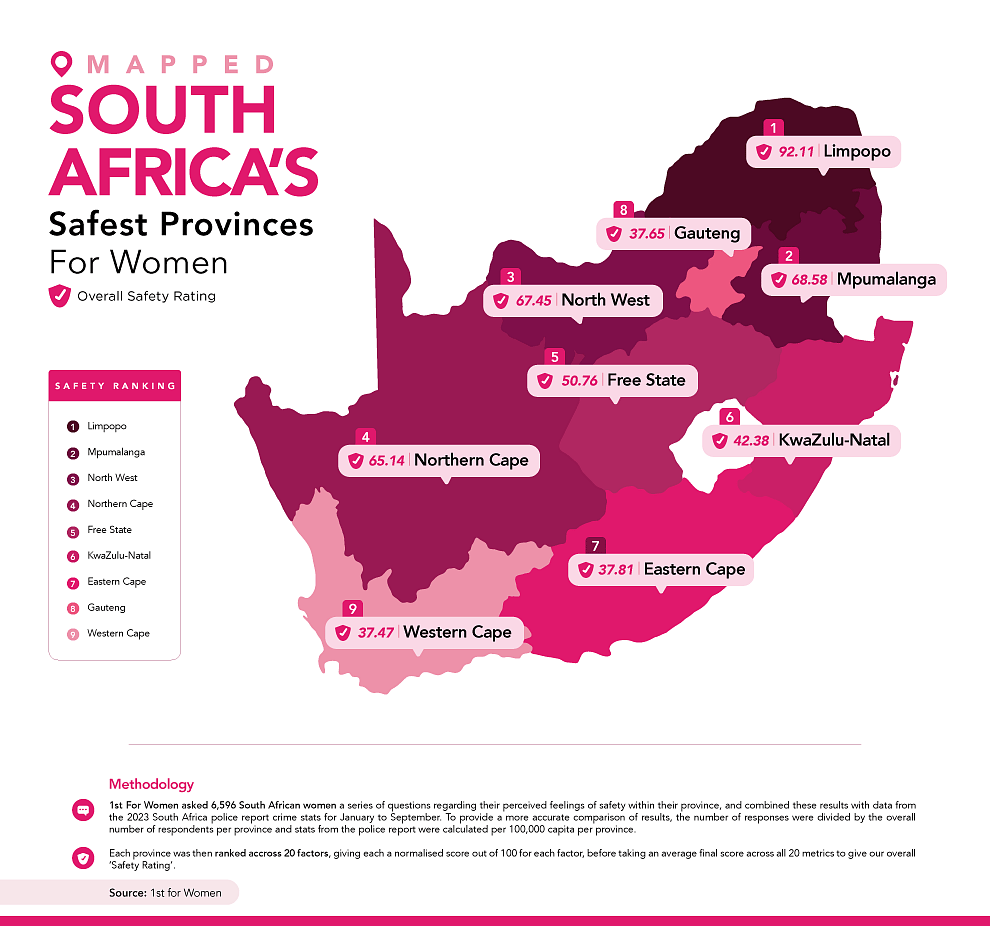
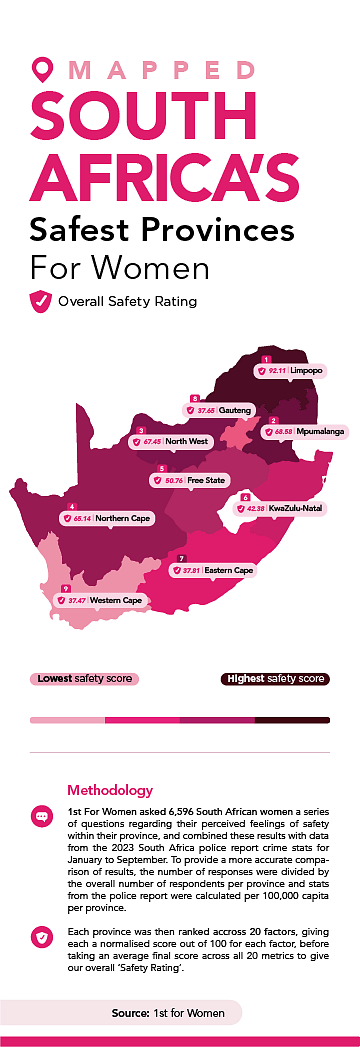
The 20 data points considered In the index
Twenty data points were used in our Safest Provinces Index to provide an overall safety score for each province, highlighting perceptions of safety whilst doing various everyday actions, like walking alone at night, driving alone, being at home alone and experiences of being a victim of crime.
Additionally, reported crime statistics per 100,000capita were considered within the Safest Provinces Index scoring. This included serious crimes (murders, sexual offences and rape), assaults with intent to inflict grievous bodily harm, car jackings, robberies at residential premises, property-related crimes, burglaries, and theft of motor vehicles.
Taking these data points into account, the province scoring the highest overall safety score is Limpopo, which emerged as the province where the female population felt the safest. They boast consistently high safety scores across all categories and reported the lowest number of annual crimes, including assault and murder.
While the NorthernCape and North West exhibit some areas of concern, with high crime figures forspecific categories of ‘Reported theft of motor vehicles’ and ‘Reportedburglaries,’ both provinces scored very well in the overall category of‘Feeling safe in the province.’ However, the EasternCape, KwaZulu-Natal, and Free State showed mixed safety performances across all categories. Gauteng follows closely behind, with most respondents feelingunsafe, especially in the ‘Walking alone at night’ category. The Western Cape emerged as the least safe province for women, scoring particularly low for the categories ‘Being homealone’ and ‘Going out with friends’ categories.
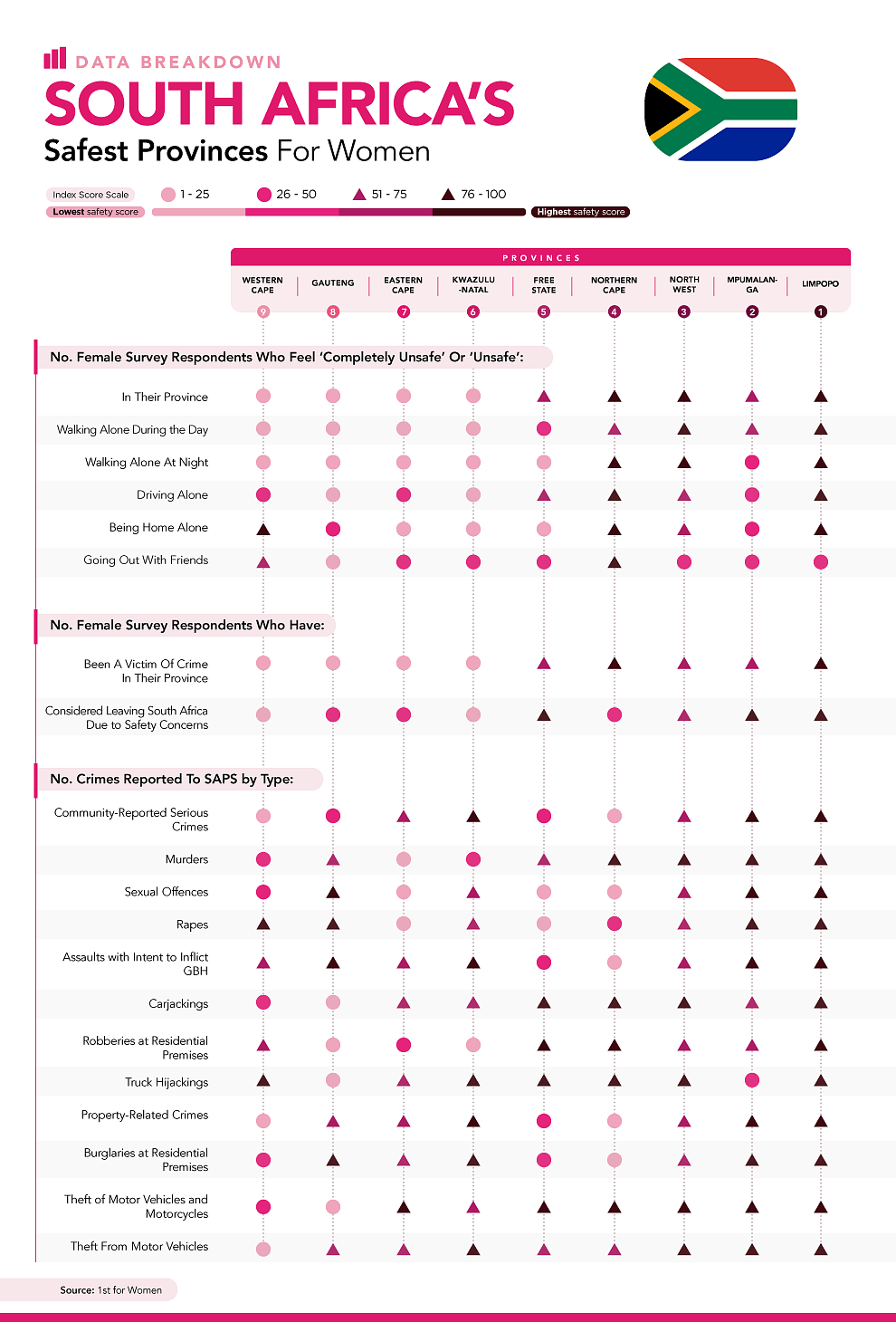
Female feelings on safety in South Africa
The survey findings on safety perceptions unveil a stark reality, where 61% of respondents confess to being victims of crime in their current provinces. A staggering 76% of women consider their provinces as "Completely Unsafe" or "Unsafe.” The weight of these fears becomes palpable as 30% of women admit they would contemplate leaving South Africa due to safety concerns.
The survey delves further into women’s lives,exposing the vulnerabilities felt while performing basic and routine activities. A startling 98% express feeling unsafe when walking alone at night.Anxieties extend to the simple act of driving alone, where 77% of women admitto feeling unsafe. Even the prospect of going out with friends becomes tingedwith unease for 63% of respondents. The sanctity of one's home, typicallyconsidered a refuge, is shattered for 54% of women who feel unsafe being alonewithin its walls.
The South AfricanPolice Services 2023 Crime Report figures paint an equally disturbing pictureof vulnerability, with a staggering 68,191 sexual offences and rapes recorded,laying bare the threat women face in their everyday lives. Furthermore, 115,578residential burglaries were reported, underscoring the reason for distress andfear of invasion into one’s home. Additionally, an unsettling number of 45,462motor vehicle thefts and hijackings reveal how women have to deal with thedangers posed by the simple act of commuting. These statistics are starkreminders of the urgent need for intervention to address women's safetyconcerns.
Amid these findings,there is also insight into potential solutions. Women offer several suggestionsto make South Africa a safer place. The call for visible 24/7 police patrolsreflects a plea for increased security and a strong police presence to deterpotential offenders. Simultaneously, the demand for tighter legislation andharsher punishments for offenders underscores the need for a robust legalframework that serves effective justice for victims.
Free self-defence classes, improved streetlights, and surveillance cameras are all suggestions that empower women tonavigate their surroundings confidently. Many respondents' suggested safetystrategies include travelling with a partner, avoiding “dangerous places”,refraining from driving at night, and carrying self-defence tools like pepperspray, highlighting how women are adapting to a challenging environment.
The survey exposes the vulnerabilities women feel while performing basic and routine activities; 98% feel unsafe when walking alone at night, 77% when driving alone, 63% are uneasy going out with friends, even the sanctity of one's home, typically considered a refuge, is shattered for 54% of women who feel unsafe being home alone. The South African Police Services 2023 Crime Report figures paint an equally disturbing picture of vulnerability, with a staggering 68,191 sexual offences and rapes recorded, 115,578 residential burglaries reported and 45,462 motor vehicle thefts and hijackings. Amid these findings, there is also insight into potential solutions. Women offer several suggestions to make South Africa a safer place. The call for visible 24/7 police patrols reflect a plea for increased security and a strong police presence to deter potential offenders. Simultaneously, the demand for tighter legislation and harsher punishments for offenders underscores the need for a robust legal framework that serves effective justice for victims.
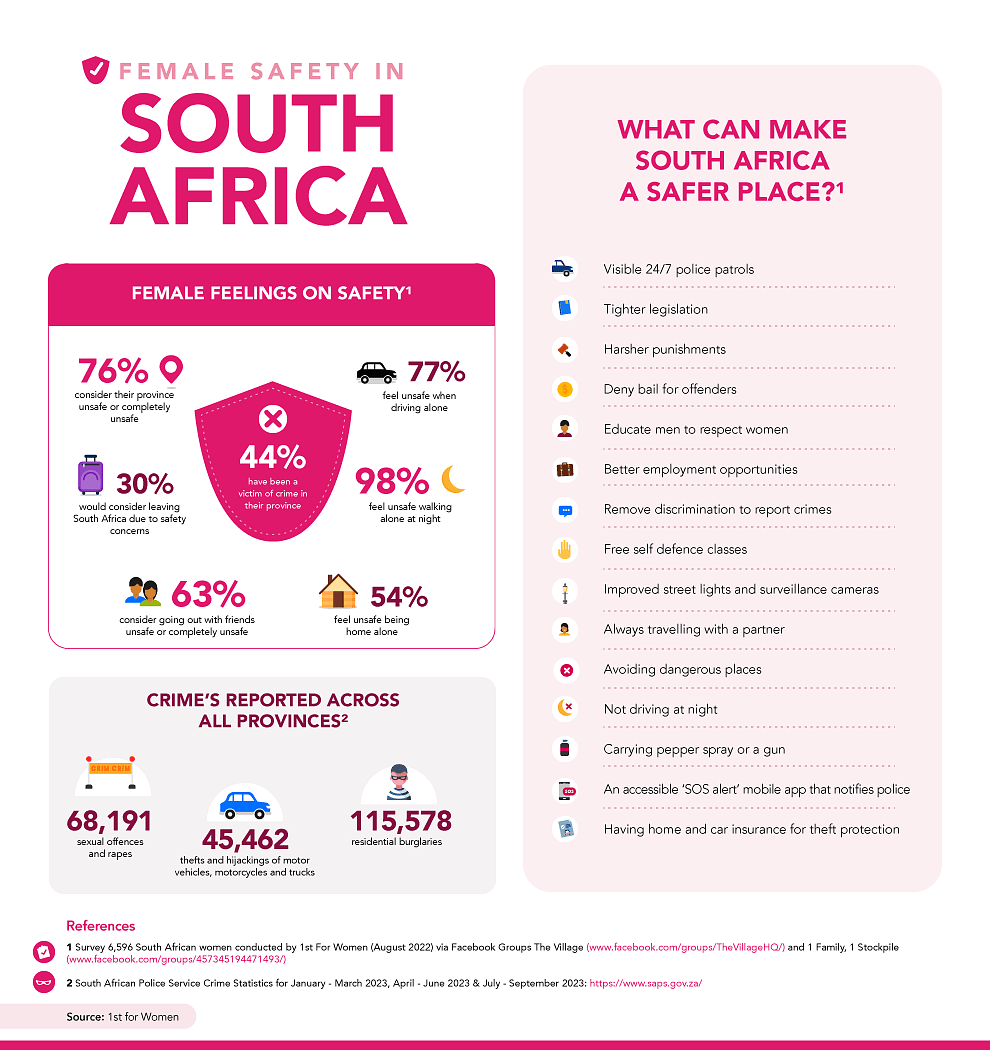
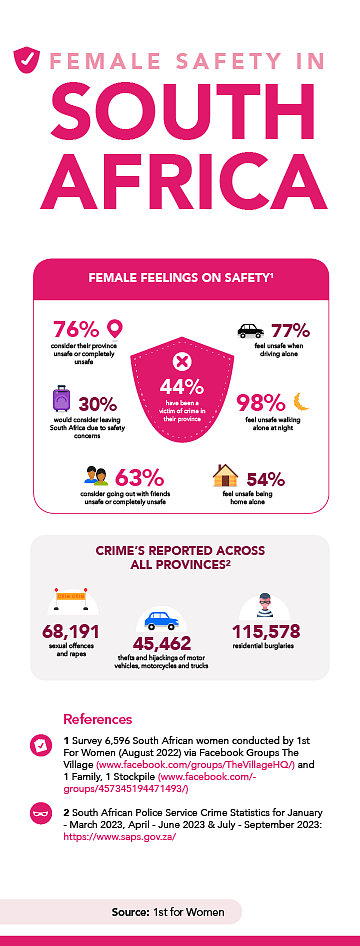
Expert tips for female safety
“Navigating daily life in South Africa, particularly for women, demands a vigilant approach to personal safety.” Sage words from Seugnette van Wyngaard, Head of First for Women, who goes on to offer women ten practical tips to enhance security and well-being:
- Stay Informed: Keep abreast of local news and crime updates. Awareness of your surroundings is the first step towards personal safety.
- Buddy System: Arrange to travel with a friend or colleague if you believe an area or journey is unsafe. There's strength in numbers, and companionship adds an extra layer of security.
- Avoid Risky Areas: Be mindful of your route and avoid poorly lit or unfamiliar areas, especially at night.
- Self-Defence Classes: Equip yourself with basic self-defence skills. Attend workshops or classes to enhance your ability to protect
yourself if needed. - Use Technology to Your Advantage: Leverage safety apps like the Guardian Angel App, designed to send alerts and your location to chosen contacts in case of an emergency.
- Home Security: Invest in robust home security measures. Install quality locks alarms, security doors, and surveillance cameras to safeguard your residence.
- Car Safety: Ensure your vehicle is well-maintained and has working safety features. Be cautious of your surroundings, especially during car trips.
- Insurance for Protection: Secure your assets with reliable Car and Home Insurance.These serve as financial safeguards in case of theft or damage.
- Trust your Instincts: If something feels off, trust your intuition. If a situation seems unsafe, remove yourself and seek help as soon as possible.
- Emergency Numbers: Save emergency contacts in your phone and have them easily accessible so you know who to call in a crisis.
Methodology & Sources
Methodology
1st For Women asked 6,596 South African women a series of questions regarding their perceived feelings of safety within their province, and combined these results with data from the 2023 South Africa police report crime stats for January to September.
To provide a more accurate comparison of results, the number of responses were divided by the overall number of respondents per province and stats from the police report were calculated per 100,000 capita per province. Each province was then ranked across 20 factors, giving each a normalised score out of 100 for each factor, before taking an average final score across all 20 metrics to give our overall ‘Safety Rating’. The factors were:
- 1. Number of respondents who consider province for women "completely unsafe" or "unsafe"
- 2. Number of respondents who consider walking alone during the day "completely unsafe" or "unsafe"
- 3. Number of respondents who consider walking alone at night "completely unsafe" or "unsafe"
- 4. Number of respondents who consider driving alone "completely unsafe" or "unsafe"
- 5. Number of respondents who consider being at home alone "completely unsafe" or "unsafe"
- 6. Number of respondents who consider going out with friends "completely unsafe" or "unsafe"
- 7. Number of respondents who have been a victim of crime in their current province
- 8. Number of respondents who would consider leaving South Africa due to safety concerns
- 9. Number of community-reported serious crimes
- 10. Number of reported murders
- 11. Number of reported sexual offences
- 12. Number of reported rapes
- 13. Number of reported assaults with intent to inflict GBH
- 14. Number of reported carjackings
- 15. Number of reported robberies at residential premises
- 16. Number of reported truck hijackings
- 17. Number of reported property-related crimes
- 18. Number of reported burglaries at residential premises
- 19. Number of reported thefts of motor vehicles and motorcycles
- 20. Number of reported thefts of or from motor vehicles
Sources:
Survey of 6,596 South African women conducted by 1st For Women via Facebook Groups
The Village (www.facebook.com/groups/TheVillageHQ/) and 1 Family, 1Stockpile (www.facebook.com/groups/457345194471493/) [August 2022]
South African Police Service Crime Statistics for January - March 2023, April - June202 & July - September 2023: Available from: https://www.saps.gov.za/ [Accessed 19/01/24]
Population figures - SA 2022 Census: https://www.statista.com/statistics/1112169/total-population-of-south-africa-by-province/[Accessed 19/01/24]

